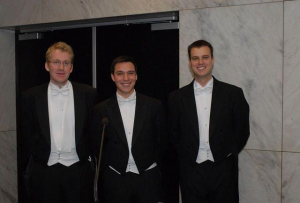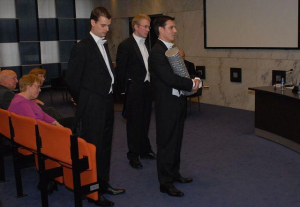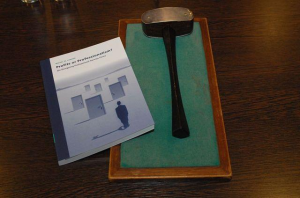PhD Defence: Designing Professional Service Firms

Given the economic crisis, Professional Service Firms (PSFs) with public functions in sectors such as law, accounting and architecture are starting to behave more like ‘regular’ organisations, adjusting their structures and processes to be able to merge, diversify and internationalise.
Historically, PSFs were organised around their public function. Now they have a double objective; providing public services such as a well-run legal system and reliable corporate audits, and at the same time making profits. But these two objectives, the public and private, can sometimes be at odds.
The implications of introducing a profit objective on performance, reputation and misbehaviour of PSFs are still unknown. In his PhD dissertation entitled Profits or Professionalism? On designing professional service firms, Michel Lander looks at the introduction of traditional organisational processes, such as strategy and governance into PSFs. In general, he finds that accountants resist processes that challenge their professional norms, whereas accounting partners also resist those that limit their autonomy.
Lander finds that the introduction of formal governance and strategy structures into law firms positively influence performance, while reputation and the quality of the lawyers maintain their positive influence. At the same time, these more formalised ways of working on a strategic level increase the number of complaints against individual lawyers. Traditional forms of governance through social processes are much more effective in curtailing this behaviour.
Finally Lander finds that firms need to choose a primary objective: to make profit, focus on reputation or ensure low levels of misconduct by their lawyers, because the organisational processes necessary to accomplish this are apparently incompatible.
Michel Lander defended his dissertation on 6 January 2012. His doctoral degree has been awarded cum laude. His promoters were <link people hans-van-oosterhout _blank>Prof. Dr Hans van Oosterhout and <link people pursey-heugens _blank>Prof. Dr Pursey Heugens. Other members of the Doctoral Committee are Prof. Dr Justin Janssen, Prof. Dr Muel Kaptein and Dr Taco Reus.
About Michel Lander

Michel W. Lander(1983, the Netherlands) received his MSc. in International Business Administration, his MSc. in Business Administration (cum laude), and his MPhil. in Business Research (cum laude) from RSM. He is currently an Assistant Professor in Management and Human Resources at HEC Paris. His research interests include the strategy and governance of professional service firms, institutional and ecological theories of organisation, and the role of individual and organisational trust in merger and acquisition processes. One of Michel’s studies has been published in the Academy of Management Journal, and another of his papers is currently in an advanced stage of the review process at Journal of Management Studies.
Michel is also the recipient of an AXA Research Fund Scholarship. He has presented his work at several international conferences, including meetings of the Academy of Management Meetings and the European Group of Organization Studies.
Abstract of Profits or Professionalism? On designing professional service firms

Research on professional service firms (PSFs) did not get off the ground until recently. This lack of attention is surprising, given their integral role in contemporary knowledge-based economies. In this dissertation, Lander focuses on two professional industries: law and accounting. Historically, these industries were infused with a dominant professional logic, with its corresponding Professional Partnership configuration as dominant form of enterprise organisation. However, changes in economic and social trends, government policies, and client preferences have led to the spread of a commercial ethos in the professions, with the corresponding configuration of the Managed Professional Business. This shift from the professional to the commercial logic is the point of departure for this dissertation. But what are the effects of this changing logic from professionalism to commercialism on PSFs? This dissertation shows, first, that the shift from professionalism to commercialism is not complete for all PSFs, as many professionals in mid-sized firms resist this new logic. Second, although in conflict with the logic of professionalism and the corresponding organisational practices, novel-to-context practices of strategy formation and formal governance do contribute to the performance of PSFs. Yet they do so at a cost, third, as they increase misconduct of lawyers which in Professional Partnerships were effectively remedied by collegial controls. Fourth, PSFs face a choice about the corporate objective function they pursue, as his final study suggests that combining professional and commercial logics in a single configuration is seemingly impossible.


